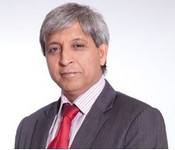
University of the Witwatersrand vice-chancellor Adam Habib.
Life is not easy for South African universities. They are struggling to deal with starving students and overcrowded residences, not to mention the fact that only a minority of students complete their courses within the allotted number of years.
At the same time, they are struggling to be taken seriously on the global academic stage, with only two local universities (the University of Cape Town and the University of the Witwatersrand) in the top 400 of the global rankings.
They are under pressure to produce more graduates, and a greater diversity of graduates, to provide the skills the economy needs. But they are at the same time expected to boost their output of research — and to ensure it is simultaneously relevant to South Africa and world class.
Delivering his inaugural address at the weekend, the new vice-chancellor of the University of the Witwatersrand, Adam Habib, tackled some of these dilemmas and navigated neatly through them, intellectually at least.
But his upbeat address did not capture just how great are some of the challenges he will face.
Prof Habib argued, compellingly, against the notion that it’s not possible for South Africa’s universities to be both "relevant" and "world class".
Wits has constantly to balance the imperatives of building a globally competitive university with the demand to be nationally responsive, but these need not be mutually exclusive goals, he said. He cited Wits’ prowess in palaeontology and in deep-level mining engineering as examples of South Africa-specific research which had made unique contributions to global knowledge. And he set out a plan to ensure Wits does a lot more in the way of research.
This is something every university in South Africa wants to do, as much because of the hundreds of thousands of rand the government pays as incentive money for research publications and postgraduate degrees, as of aspirations to be world class. Prof Habib was highly successful in his previous post at the University of Johannesburg in buying in high-class academic researchers, and he clearly wants to replicate this at Wits.
He outlined plans to address the university’s challenges in several areas. Research is one. In pursuit of global competitiveness, he plans to recruit 30 new A-rated scholars and establish a number of new multidisciplinary institutes, as well as doubling the number of post-doctoral fellows and boosting funding for postgraduate study.
But he will also be responding to the acute local challenge of the large number of students who simply do not cope at university, at least not without support. In a welcome move, he announced that Wits will revitalise its academic support programmes and throughput capacity by establishing an academy to identify and support struggling students. He will also introduce a new equality scholarship to target top students in the most marginalised and depressed schools.
This is all good. But one big issue is going to be resources. As Prof Habib himself said, South Africa’s higher education institutions are heavily underfunded by the state — probably to the tune of about 40% compared to their foreign peers. All the things he wants to do are expensive. The university will have to make hard choices. And it will have to try to find resources itself, as well as lobbying for the state to invest more in universities as a whole.
Then there is the issue of teaching. Research is crucial, and the government recognises that in the incentives it provides for this. But favouring the A-grade researchers at the expense of those who teach our undergraduates cannot make for a robust academic community, nor can it ensure that universities contribute as they should to building young graduates who will go out into the world and make it a better and more productive place.
So the new vice-chancellor will have to find a balance. We wish him and Wits the very best of luck.
Article Source: http://www.bdlive.co.za/opinion/editorials/2013/08/27/editorial-testing-times-for-habib-at-wits
